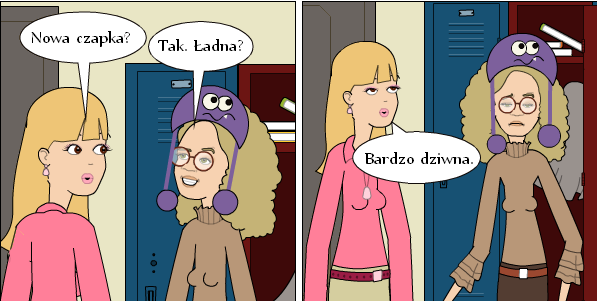Beginner Polish learners get sometimes confused seeing so many words with a quite strange (from foreigner’s point of view) spelling: dziękuje, dzień, dziewczyna. “Dzi”: how for God sake do I pronounce it?! These three letters are represented by one sound. Let's call it the "dzi" sound. Is it possible to avoid words with this strange “dzi” sound?
I have a bad and a good piece of news for you. The bad news: it’s almost impossible to avoid the “dzi” sound when you speak Polish, because many the most frequent and useful Polish words contain “dzi” sound. How can we talk not using words like: "thank you", "day", "girl", "family" or "child"? I can’t imagine that. These words are so basic, that they do not have even synonyms.
The good news: my experience as a Polish teacher shows that the most foreigners don't have big problems with pronunciation of this sound. Even if your pronunciation of this sound isn’t perfect, you will be understood by Poles. There is a really very small risk for misunderstanding. Just try to pronounce it with help of my recordings.
Some popular Polish words with the "dzi" sound" (native speaker voice):
Here are the recorded words:
a) The “dzi” sound at the begging of the word: dzień (day), dzień dobry! (Good morning!), dziękuję (thank you!), dziewczyna (girl and girl-friend), dziecko-dzieci( child –c hildren), dziwny (strange) ,
Some popular Polish words with the "dzi" sound" (native speaker voice):
Here are the recorded words:
a) The “dzi” sound at the begging of the word: dzień (day), dzień dobry! (Good morning!), dziękuję (thank you!), dziewczyna (girl and girl-friend), dziecko-dzieci( child –c hildren), dziwny (strange) ,
B) The “dzi” sound in the middle of a word: niedziela (Sunday), poniedziałek (Monday), rodzina (family) , godzina (hour, time), ludzie (people)
C) The “dzi” sound at the end of the word: siedzi ( is sitting or sits*: third person singular), widzi ( is seeing or sees*: third person singular),
*There is only one Present tense in Polish, so we can translate it differently in different contexts.
And here are some tips for pronounciation:
The “dzi” sounds like "jee" in English but softer, not so strong. It is rather something between "dee" and "jee". Just try to say "jee" while your mouth is positioned to say "dee".
And here are some tips for pronounciation:
The “dzi” sounds like "jee" in English but softer, not so strong. It is rather something between "dee" and "jee". Just try to say "jee" while your mouth is positioned to say "dee".
Let’s have a look at some important words and phrases with “dzi” sound.
1. Dzień dobry! Dzisiaj niedziela.
1. noc – dzień (night - day)
2. - Dzień dobry! Dzisiaj niedziela! Good morning! Today is Sunday.
Here is a recording with the words and the monologue above (the Polish native speaker voice):
2. Dziwny - dziwna - dziwne.
dziwny, dziwna, dziwne - (strange) - masculine, feminine and neuter forms of the adjective "dziwny". "Dziwny" is also a basic grammar form which you can find in a dictionary)
Czapka - (winter hat) is a feminine noun, that's why we should say:
"ładna czapka" (a nice winter hat) or "dziwna czapka" (a strange winter hat), not ładny czapka nor dziwny czapka.
The dialogue:
- Nowa czapka? (a) new winter hat?
- Tak. Ładna? Yes! Is it nice (pretty)?
- Bardzo dziwna! (It’s) very strange (odd)!
3. Dziewczynka, dziewczyna - what's the difference?
dziewczynka - girl, baby-girl, child, not teenager
dziewczyna1 - girl: teenager or young woman
dziewczyna2 - girl-friend (the second meaning of the word, a translation depends on the context)
moja dziewczyna - my girlfriend
twoja dziewczyna - your girlfriend
To jest moja dziewczyna. This is my girlfriend.
Here is a recording with the words and expressions above (Polish native speaker voice):
A grammar note: "moja" means "my", but only when we talk about feminine nouns, for instance: "moja czapka" (my winter hat) , "mój" means "my" for masculine nouns (objects), for instance: "mój syn" (my son) and "moje" means my for neuter nouns; for instance "moje dziecko" (my child),
The same with a word "twoja": we use "twoja" (your, singular) - for feminine objects, "twój" (your, sungular) for masculine objects, "twoje" (your) for neuter objects.





The recordings are available again.
ReplyDeleteThe pictures and diologues are so fun. Thank you.
ReplyDeleteI do my best!
ReplyDeleteGreat post! One thing- you wrote "god news" instead of "good news".
ReplyDeleteThank you! I appreciate such corrections.
Delete